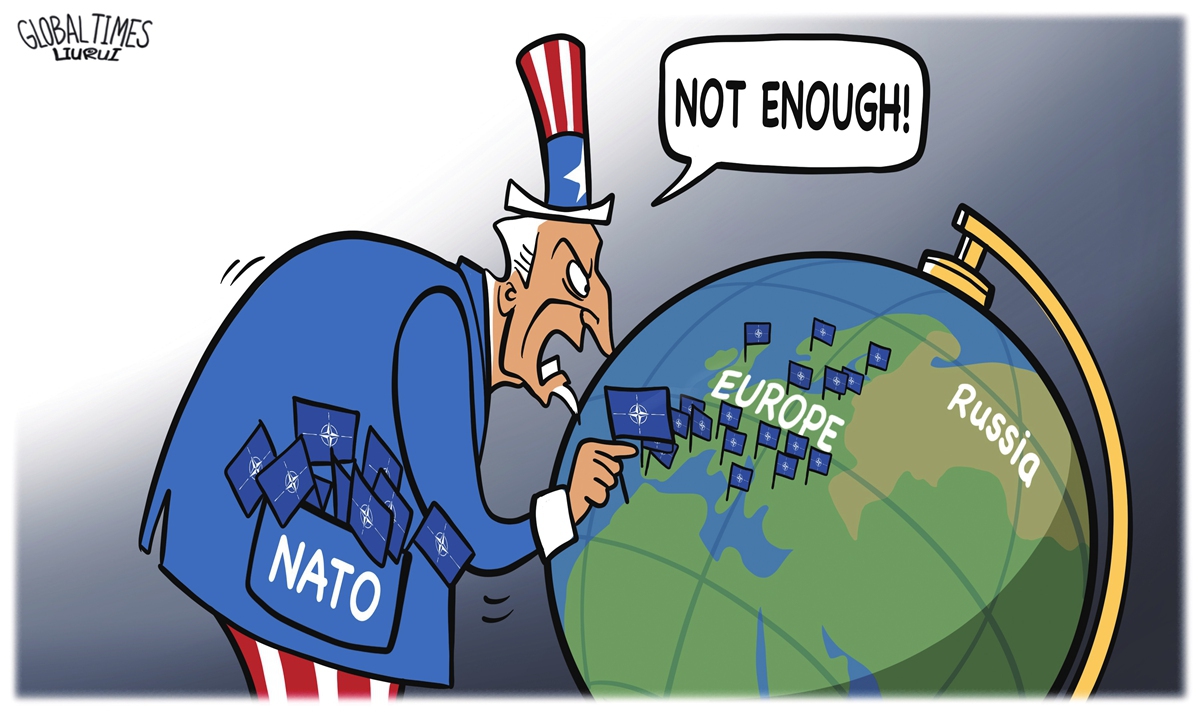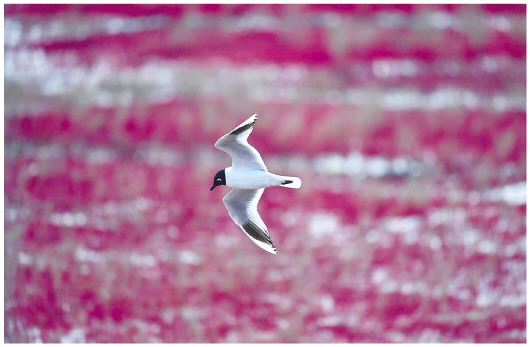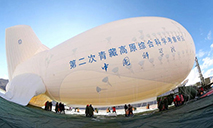Washington hijacks ‘collective security of EU’ to serve anti-Russia strategy, benefit from NATO expansion

Nato expansion. Illustration: Liu Rui/Global Times
After Finland and Sweden formally submitted letters on Wednesday to join NATO, the new round of expansion of the US-led military alliance is very likely to be further strengthened, however this change will not reinforce the collective security of Europe, but will only benefit the US as Washington can only rebuild its declining hegemony upon keeping other regions intense or by instigating more conflicts, said analysts on Wednesday.
The nature of the Russia-Ukraine conflict is a strategic game between Moscow and Washington, and the fact proves that the conflict has created a new situation that harmed Ukraine, Russia and the rest of Europe, but only benefits the US. Now Washington wants to keep this situation so NATO continues to expand, and the result is that Russia will not compromise and relevant countries will not be more secure but could become the new frontlines that directly face the unpredictable Russia-US confrontation, experts noted.
US President Joe Biden on Thursday will welcome the Prime Minister of Sweden and the President of Finland to the White House in a key show of support days after both countries announced they would seek to join NATO, CNN reported on Tuesday.
The leaders are expected to discuss Finland and Sweden's NATO applications, European security and support for Ukraine, White House press secretary Karine Jean-Pierre said in a statement.
Washington needs tensions in Europe
The US will absolutely welcome the decision as it loves to see new tensions occur in more places in Europe like the border between Russia and Finland, as well as the Baltic region since Russia could be forced to deploy new weapons and military equipment to exclave Kaliningrad to respond the new expansion of NATO, said Lü Xiang, an expert on US studies and a research fellow at the Chinese Academy of Social Sciences.
"Because before the Russia-Ukraine conflict, NATO was already in a state of 'brain death,' as French President Emmanuel Macron said in the past, so to instigate and provoke a massive conflict between Russia and Ukraine was a key plan promoted by the US to save or continue the life of NATO, and now we can clearly see that the conflicts and wars are the source of US power upon Europe," in other words, the more wars and tensions in Europe, the more powerful and united NATO would become, he noted.
The reason NATO's influence had declined is that the strength of the US is declining, and Washington under the Trump administration was unwilling to become too involved in global issues. This waning trend of the US will not change as long as the majority of the international community keep the peace and development as the mainstream and the globalization could be improved and continued. However, if the world enters a new Cold War with endless conflicts and tensions, the life of US hegemony will be extended, said Cui Hongjian, director of the Department of European Studies at the China Institute of International Studies.
"It's just like a dying vampire receiving new blood," said an anonymous Beijing-based expert on international relations, noting that the newly rising powers around the world need to understand that launching confrontations will not speed up the decline of the old hegemony, because the "vampire" wants to see more "blood," so insisting the peace and development is the right way to reform and improve the world order.
In order to save its waning global influence, the US has been working hard to coordinate with its allies by demonizing Russia and blowing up threats posed by Russia, while in the meantime, the US offers security promises to lure and rope in its European allies. But no wonder, from provoking the Russia-Ukraine conflict to expanding the NATO military alliance, the US has kidnapped the security of Europe and its allies to underpin its own power and interests, Cui said.
In the name of offering so-called protection and aid to Europe, the US takes this chance of making itself a potential alternative option to provide Europe with energy as many European countries have been forced to cut energy imports from Russia. Cui said. "In other words, the US gains far more than Europe does in the Russia-Ukraine conflict."
Nuclear crisis in Europe
The expansion of NATO to include Finland and Sweden will take some time. Although Turkey, a NATO member state, has expressed its stance of opposing the applications submitted by the two North Europe countries, observers said Ankara is unlikely to stop the process while Washington shows full support. The process could take up to a year, so to what extent Russia would respond, especially after it ends the conflict with Ukraine, would be key to the issue.
Whether Finland and Sweden will actually be safer after joining NATO is unclear but what is for sure is that the expansion of the military alliance further stirs up regional instability and is staged to introduce flames of war to the Baltic region, experts said.
A report by Aljazeera quoted a source saying that Russia could deploy nuclear weapons and hypersonic missiles in the Russian exclave of Kaliningrad if Finland and Sweden joined NATO.
Song Zhongping, a Chinese military expert and TV commentator, told the Global Times that "the nature of the NATO-Russia standoff is one of strategic competition between the US and Russia. The real concern of Russia is not about Finland and Sweden gaining NATO membership, but about the possibility of US missile defense system or nuclear weapon deployments in these two countries."
Russian President Vladimir Putin has signaled Russia will tolerate Finland and Sweden joining NATO, but warned the Kremlin would respond if the alliance installed military bases or equipment in either country, the Financial Times reported.
The Russian president said on Monday the proposed NATO enlargement posed "no direct threat for Russia," adding that he had "no problems" with either Finland or Sweden, the report said.
Sweden has repeatedly said it does not want NATO military bases on its soil or to host nuclear missiles. Finland is thought to be unlikely to want this either, but said on Sunday that it would not set conditions before its membership.
After joining NATO, Finland and Sweden would very likely lose the independence of decision-making in terms of allowing the US to deploy weapons and military bases in their territories, even though the two northern European countries do not wish to provoke Russia in such a way, Song said.
"So, it's entirely possible that Russia deploys nuclear weapons in Kaliningrad and other regions to respond the potential threat, and this would cause new tensions and even a nuclear crisis in the future," Song noted.
Lü echoed that at the moment Russia is focusing on the conflict in Ukraine, but when the conflict ends one day, it would have the capability to deal with the expansion of NATO in other directions. "Some NATO members are being more and more hostile against Russia, such as Lithuania and Poland, so when Moscow finishes its military operation in Ukraine, it would be able to deal with them. So Europe won't be more secure with the NATO expansion, but more uncertain and dangerous."
Photos
 China’s central bank to issue commemorative coins on cultural theme of auspiciousness, including two heart-shaped coins
China’s central bank to issue commemorative coins on cultural theme of auspiciousness, including two heart-shaped coins Population of endangered black-headed gulls exceeds 10,000 mark in NE China’s coastal city of Panjin
Population of endangered black-headed gulls exceeds 10,000 mark in NE China’s coastal city of Panjin China's self-developed floating airship breaks record
China's self-developed floating airship breaks record Chinese germplasm bank conserves biodiversity in warm temperate zone
Chinese germplasm bank conserves biodiversity in warm temperate zone
Related Stories
- Baby formula shortage throws U.S. families into panic
- Feature: U.S. border town braces for influx of migrants as partisan fights rage on
- "Failure of an American ideology" contributed to 1 mln COVID-19 deaths in U.S.: The Guardian
- U.S. faces dramatic baby formula shortage caused by inflation, product recall: France 24
- Venezuela confirms U.S. decision to ease oil sanctions
Copyright © 2022 People's Daily Online. All Rights Reserved.






